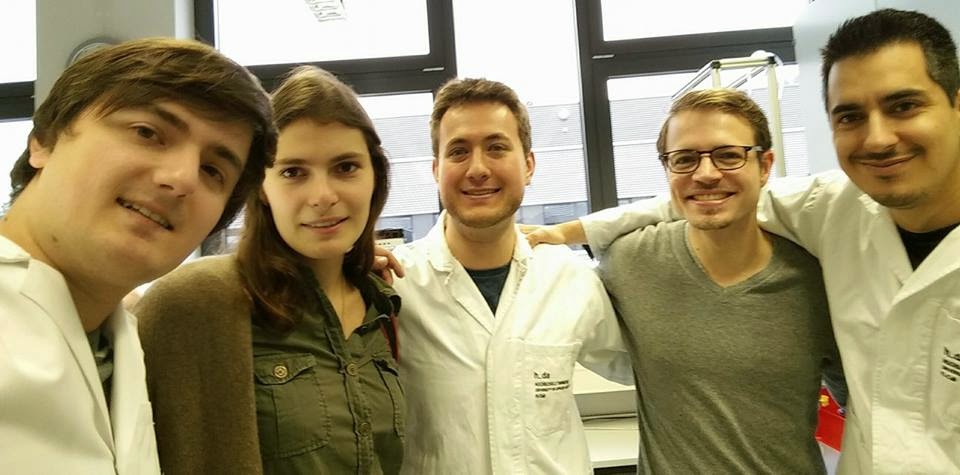
Mars is a very harsh and hostile environment for future human explorers and like any other known planet it has no breathable air.
That could change someday, and it may be soon enough for our generation to witness it, as the student team from Germany has a bold vision to make a first step to terraform the Red Planet, turning it more Earth-like.
The plan is to send cyanobacteria to Mars to generate oxygen out of carbon dioxide which is the main component of Martian atmosphere (nearly 96%). “Cyanobacteria do live in conditions on Earth where no life would be expected. You find them everywhere on our planet!” team leader Robert P. Schröder told me. “It is the first step on Mars to test microorganisms.”
The project is participating in the Mars One University Competition and if it wins, it will be send as a payload to Mars, onboard the Dutch company’s mission to the Red Planet. Now everyone can vote to help make it happen by visiting the CyanoKnights.bio webpage.
That could change someday, and it may be soon enough for our generation to witness it, as the student team from Germany has a bold vision to make a first step to terraform the Red Planet, turning it more Earth-like.
The plan is to send cyanobacteria to Mars to generate oxygen out of carbon dioxide which is the main component of Martian atmosphere (nearly 96%). “Cyanobacteria do live in conditions on Earth where no life would be expected. You find them everywhere on our planet!” team leader Robert P. Schröder told me. “It is the first step on Mars to test microorganisms.”
The project is participating in the Mars One University Competition and if it wins, it will be send as a payload to Mars, onboard the Dutch company’s mission to the Red Planet. Now everyone can vote to help make it happen by visiting the CyanoKnights.bio webpage.
The team behind the initiative is composed of a voluntary and interdisciplinary group of students and scientists, from the University of Applied Science and Technical University, both located in Darmstadt, Germany. They call their project ‘Cyano Knights’ as Schröder explains: “Because of the long history of those Cyanos and their will to survive I named it Cyano Knights and sent the payload proposal instantly to Mars One.”
The students work on their project in the laboratory of Cell Culture Technology of the University of Applied Science and they are also in contact with different institutes, not only from Germany.
Cyanobacteria will deliver oxygen made of their photosynthesis, reducing carbon dioxide and produce an environment for living organisms. Furthermore, they can supply food and important vitamins for a healthy nutrition. The team is already testing cyanobacteria with different environmental conditions in quarantined photobioreactors and monitoring their activities to determine the best working solution on Mars.
 |
| Cyanobacteria Spirulina. Credit: cyanoknights.bio |
Schröder reveals that the idea was born in August this year. But why cyanobacteria? “Initial ideas were of a technical nature, but that was too boring for me. In school I liked biotechnology and that have not changed very much. Once I heard of cyanobacteria and how they can survive in harsh conditions on earth and at this special night I had a flashback which grabbed me and convinced me completely,” he explains.
The team ensures that at the end of the mission those very well quarantined microorganisms will be terminated. “We will destroy our microorganisms because we don’t want to harm Mars,” Schröder adds.
So what amount of this bacteria will be needed to fully provide the habitats? “As for now we don't know that really, because we need to find out the best habitable conditions for each strain to cultivate them and then we have references and can calculate it,” Schröder says. “We need to test Mars-like conditions and analyze how much energy we have to put into the photobioreactor. So it’s a lot work to do.”
Mars One will take one project to Mars along with its unmanned lander mission in 2018. Voting submission will be accepted until Dec. 31, 2014. The winning university payload will be announced on Jan. 5, 2015.
Schröder, also a hopeful Mars One colonist is convinced that this is a once in a lifetime Mars shot: “I am proud to be a Mars One astronaut candidate of the current round and don't plan to participate in other missions to get to Mars.” So it’s more like an ultimate battle for King Robert and his Cyano Knights with Mars at stake.
Vote for the project at: CyanoKnights.bio






Comments